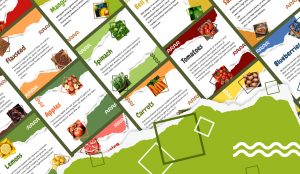This bundle includes 20 high quality images with unique and relevant texts. Download these ready made content for your social promotions.
Plant based diet has been frequently linked to a lower risk of a variety of diseases and health conditions. In addition, studies suggest that this kind of diet is more effective at helping people lose weight. The idea that plant-based diets are poor in protein is a common misconception, because protein can be found in vegetables, fruits, grains, nuts, seeds, and legumes. Here is a list of 20 plant foods that contain a high amount of protein per serving.

Chia seeds
These tiny little nutritional powerhouses contain about 3.5 grams of protein per 2 tablespoons. They also contain other important nutrients for plant-based diets like calcium, iron, and zinc.

Tofu
Tofu is the highest protein source out of all plant-based food. It contains all the essential amino acids your body needs, and also provides fats, carbs, and a wide variety of vitamins and minerals.

Whole Grain Bread
Besides containing about 6 grams of protein per slice, whole grain bread is also a great source of fiber, which helps to maintain a healthy digestive system and prevent chronic diseases such as cancer and cardiovascular disease.

Quinoa
Quinoa is considered to be a “complete protein” by some people, moreover, it has a large amount of all of the essential amino acids and 8 grams of protein per cup, making it an excellent plant-based protein option.

Hemp Seeds
Hemp seeds roughly contain 6,5 grams of protein per two tablespoons and are so easy to toss into salads, smoothies, and bowls for a boost of plant-based protein.

Peanut Butter Powder
While peanut butter is an excellent source of healthy fat, peanut butter powder gives you more protein per calorie so it’s a great way to boost the content of plant protein in your food.

Oats
Most people think of oats as only carbohydrates. But a whole rolled oats pack contains about 11 grams of protein per cup.

Nutritional Yeast
These nutty golden flakes are a must-have for plant-based eaters. Two tablespoons include around 8 grams of protein, a significant amount of iron, and a variety of B vitamins.

Broccoli
One cup of cooked broccoli has almost 4 grams of protein. That’s quite a lot for a vegetable. In addition to protein, broccoli also offers filling fiber, vitamins K, C and more.

Mushrooms
Mushrooms have a meaty texture, containing 2.11g of protein per 100g, they are ideal for replacing meat in a plant-based diet. Moreover, mushrooms contain fiber and essential vitamins and minerals good for our body.

Lentils
With 18 grams of protein per cup lentils are a great source of protein. They are also a great source of fiber, can help promote a healthy gut, may also reduce your chance of heart disease, diabetes, excess body weight, and certain types of cancer.

Beans
Kidney, black, pinto, and most other varieties of beans contain about 15 grams of protein per cup. They’re also great sources of complex carbs, fiber, iron, folate, phosphorus, potassium, manganese, as well as several beneficial plant compounds.

Green peas
Green peas contain nearly 9 grams of protein per cup, a serving of green peas is enough to cover more than 25% of your daily fiber, manganese, and vitamin A, C, and K needs. They are also a good source of iron, zinc, copper and other B vitamins.

Buckwheat
Buckwheat is high in both protein and fiber, with 100g providing about 5g of protein, and it’s also gluten-free. Due to its low calorie content, it can become an excellent addition to a plant-based diet.

Chickpeas
Chickpeas are a versatile and tasty source of plant-based protein. 100 grams of chickpeas roughly contain 19 grams of protein. In addition, they are a low-fat, high-fiber food, providing a good source of calcium and magnesium.

Brussels sprouts
They’re delicious roasted, steamed, or even shredded in a salad and contain 5.64 grams of protein per cup (even boiled from frozen).

Soy milk
Soy milk is made from soybeans and is usually fortified with vitamins and minerals. Not only does it contain 6 grams of protein per cup, it’s also a great source of calcium, vitamin D and vitamin B12.

Wild rice
A cup of wild rice contains nearly 7 grams of protein, in addition, they have healthy amounts of fiber, manganese, magnesium, copper, phosphorus, and B vitamins.

Spirulina
Two tablespoons of this nutritional powerhouse contain 8 grams of complete protein, in addition to covering most of your daily requirements for iron and copper. Spirulina also contains high amounts of magnesium, riboflavin, manganese, potassium and essential fatty acids.

Nuts
One ounce of most nuts roughly contains 5–7 grams of protein, depending on the variety. Nuts are also excellent sources of fiber and healthy fats, along with iron, calcium, magnesium, selenium, phosphorus, vitamin E, and certain B vitamins.
Ads Design Maker for Social Media Needs
Everyday tool for SMM needs.



